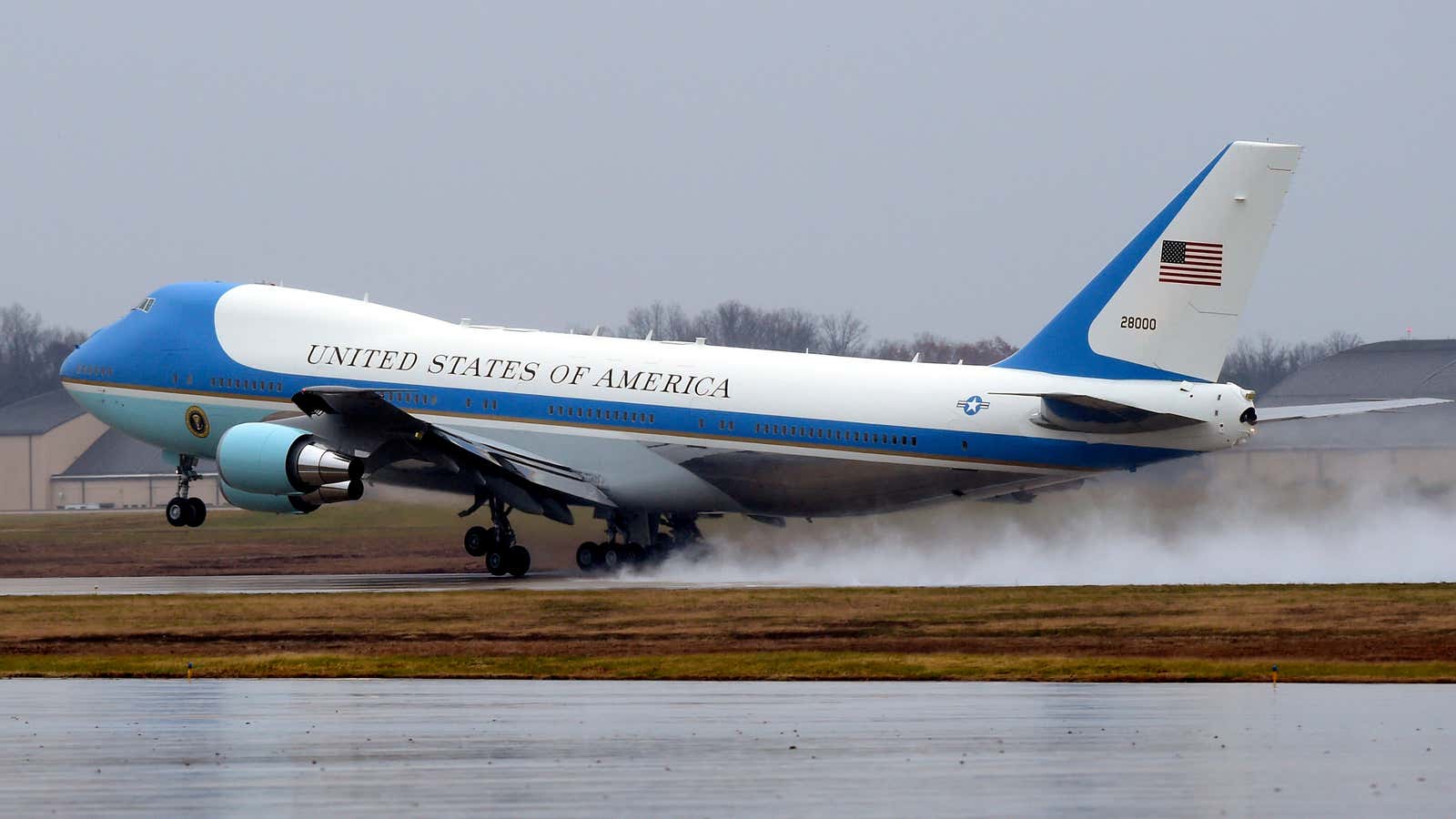After Boeing’s CEO fretted publicly about president-elect Donald Trump’s anti-trade views, Trump attacked the company on Twitter, exaggerating the costs of a Boeing project to build new jets for the US president and threatening to cancel the contract.
According to the company, Boeing is under contract for $170 million to design new presidential aircraft, known as Air Force One, to begin service in 2024. (The current planes have been in service since 1990.) No mere jetliner, these planes are required by the US military to allow the president to essentially run the country—or a war—from the air, with classified communication technologies, expensive sensors and defense equipment.
In his tweet, Trump claimed that the plane would cost more than $4 billion. An Air Force spokesperson told Quartz that the service is working with Boeing to identify the final cost of the program, and has budgeted $2.7 billion for the two to three aircraft, “but expect this number to change as the program matures with the completion of the risk reduction activities.” A 2016 analysis of the program by the government’s auditors estimated the total cost at $3.2 billion.
A Boeing spokesperson said Congress will need to appropriate funds for the final contract to actually build the planes, noting that a standard 747-8, the model the presidential aircraft will be based on, has a list price of $379 million.
“We look forward to working with the U.S. Air Force on subsequent phases of the program allowing us to deliver the best planes for the President at the best value for the American taxpayer,” the company said in a statement.
Boeing, the largest aerospace company in the world and biggest exporter in the US, saw its stock fall, then rise again after Trump’s tweet. In 2013, Trump trumpeted his prowess at purchasing Boeing shares during a dip in the company’s fortunes. Boeing was not listed among his $38 million in stock holdings on Trump’s federal disclosure forms in May. A spokesman for the president-elect said Trump sold all of his public company stock in June, but provided no details, so it isn’t known when—or if—Trump sold his Boeing position. The June sales presumably don’t include positions held by his children, who remain official advisers to his presidential transition team.
Asked by reporters where Trump had gotten his information about the cost of the new planes, Trump’s spokespeople declined to say, but noted that when you add up the costs “it’s a pretty big number,” and that the president-elect will “look to try to save taxpayer money.”
The reason for Trump’s outburst isn’t clear; the Boeing contract was awarded in January 2015. As Trump tweeted, the Washington Post broke news about a Pentagon report identifying $125 billion in unnecessary spending. The Post said that the report was quashed by Defense officials.
Boeing CEO Dennis Muilenburg did express his worries about the future of US trade policy in remarks on Dec. 2 at the Illinois Manufacturers Association, which were covered today in a Chicago Tribune story published shortly before Trump’s tweet.
“Now that the campaign is over, I hope we can work together to make sure the United States continues to play a leading role in shaping the global economy through trade agreements,” Muilenburg said. “[If] we do not lead when it comes to writing these rules, our competitors will write them for us. For Boeing, that could result in higher costs, disrupted supply chains and regulations that diminish our ability to sell products around the world.”
Exports make up a huge portion of Boeing’s business, according to Aviation Week, with 5,500 of 7,522 jets built by Boeing between 2000 and 2015 heading to overseas customers. Many are sold in China, the target of much of Trump’s trade ire. Any backlash could be painful for Boeing and its stakeholders.
The president-elect may want the contract cancelled, but it will be difficult for the US government to find a different vendor. Air Force officials insist that the plane have four engines for extra reliability; the only two companies who make four-engine jet airliners are Boeing and the European champion, Airbus, which is based in a suburb of Toulouse, France.
After handing out tax breaks to keep just 800 jobs in Indiana, it’s hard to imagine the Trump team sending jobs—and a massive symbol of national pride—to France.
